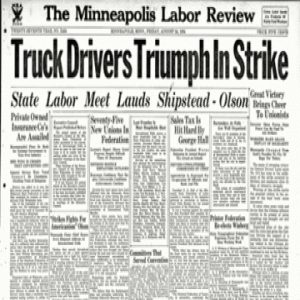
On this day in labor history, the year was 1934.
That was the day trucking bosses and leading Teamsters in Minneapolis reached a tentative agreement after a tumultuous week of fighting in the City Market.
Strikers won many of their demands, including union recognition and reinstatement of all strikers.
Such thorough victory at the Battle of Deputies Run earlier in the week had shaken city elites to the core.
As the dust settled on the picket lines, Governor Floyd Olsen had called a 24-hour truce in an effort to organize negotiations.
The debacle of Ohio National Guardsmen attacking Toledo strikers had reached Minneapolis.
Fears of a growing ‘Red Menace’ fueled demands for a settlement, prompting Olsen to order National Guardsmen into the city’s armories, armed to the teeth.
Historian Bryan Palmer, author of Revolutionary Teamsters: The Minneapolis Truckers Strikes of 1934, observed that the May 25 deal settled the strike quickly enough, but final victory would be postponed.
Strike leaders had to choose which concessions to make under immense pressure from state politicians, intractable employers and federal mediators.
They also worked to avoid a potentially deadly confrontation with the National Guard.
Above all, they demanded union recognition, agreed to arbitration of future disputes and withdrew the demand for a closed shop.
There was no contract and the inclusion of inside workers proved contentious.
Palmer adds the gains were limited but real enough, as strike leaders spelled out: What had begun as a violent assault on strikers ended with workers fighting in their own interests, learning they had only their union to rely on.
The open shop offensive was defeated and union recognition was won. In the weeks ahead, it would become clear the fight was far from over.
More Episodes
 2024-08-03
2024-08-03
 2024-08-02
2024-08-02
 2024-07-31
2024-07-31
 2024-07-30
2024-07-30
 2024-07-28
2024-07-28
 2024-07-28
2024-07-28
 2024-07-22
2024-07-22
 2024-07-20
2024-07-20
 2024-07-18
2024-07-18
 2024-07-17
2024-07-17
 2024-07-16
2024-07-16
Create your
podcast in
minutes
- Full-featured podcast site
- Unlimited storage and bandwidth
- Comprehensive podcast stats
- Distribute to Apple Podcasts, Spotify, and more
- Make money with your podcast
It is Free
- Privacy Policy
- Cookie Policy
- Terms of Use
- Consent Preferences
- Copyright © 2015-2024 Podbean.com




